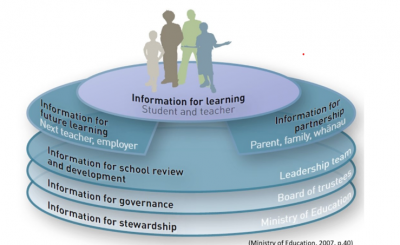Assessment for learning – “Learning is the thing”
By Bernie Leonard on June 23, 2021 in Assessment for learning
What do you think of when you see the word ‘assessment’? Is your first thought that assessment is a function of teachers? Isn’t it the teacher’s role in assessment to look at the data that is collected and presented in graphs or tables, and make decisions based on this information?
In my view, it’s very easy to fall into the mindset that assessment is something done to students to measure their achievement and progress and decide what to teach next. Perhaps even, assessment can be seen as a time-point activity for reporting purposes only, rather than an ongoing, day-to-day activity that serves as the bridge between teaching and learning.
Principals are well aware that school leadership, parents, boards of trustees and the Ministry of Education all need timely assessment information. But how important do we regard this model from the NZ curriculum, which shows clearly that all assessment should be information for learning in the classroom.

One of the seven principles of learning (OECD report: The Nature of Learning) is assessment for learning. Assessment for learning promotes a learning environment that involves students in assessment. In this learning environment students are very clear about what is expected, what they are doing and why. They know how to assess their own learning, and they understand the importance and usefulness of formal and informal assessments in helping them learn. This important OECD report describes the use of assessment for learning in guiding learners to better outcomes. Assessment should provide feedback that continually informs the learner, the teacher and the learning itself. By this definition, assessment is not just a teacher or leader activity – it’s a capability that students need.
As leaders, we collaborate with our team to set out our assessment schedule for the year to ensure we have the up-to-date information about trends and patterns of achievement and progress. We use this information to make the important strategic decisions for our school. But how often, when planning for assessment, do we consider the effectiveness of our practice in gathering and using assessment information with students? Do we look at the bigger question of whether our assessment schedules focus on doing assessment to students rather than with them so they are informed about their learning?
Good assessment targets three key questions:
Where are the learners in their learning?
Where are the learners going?
What needs to be done to get them there?
An additional fundamental question however, if you really see assessment as the bridge between teaching and learning, is:
How well could the learners in your class/school answer these three questions above?
So, how does you assessment policy and schedule reflect quality assessment principles?
Does your assessment policy and schedule include inquiring into practice about the understandings and strategies students need in order to be involved in informal and formal assessment processes?
Do your students have the capabilities to use assessment information to decide on their current and future learning needs?
The most important feature of any of assessment policy and schedule is that it supports and drives teaching and learning; all assessment information should drive the next steps for both teacher and student(s) for learning. The role of students in assessment is to be fully involved in any assessment decision so that they can take ownership of and joint responsibility for their learning progress.
To truly value assessment as the bridge between teaching and learning, I believe all principals and teams should periodically revisit their thinking about assessment. Are we seeing assessment as fundamentally FOR learning? Do we see assessment as a partnership between our students and teachers to drive learning forward?
Taking the time to learn more about assessment for learning as a team is a vital step to truly understand what these practices mean and look like to make your assessment policy, and schedule a more meaningful and effective tool for engaged, connected and capable learners.
After all, learning is the thing we are all about!
If you’d like to learn more about assessment for learning get in touch today
Other articles you might like
Have a think about the last time you deliberately had to learn something. What did you do to help you learn? What helped? What was most useful?
I have had the privilege over the last four years of leading the project team that provides timely, targeted, responsive and planned support for principals across the country for their first two years after appointment.
A few years ago I visited a school for the first time and a teacher asked what my job was. I told her that I was a facilitator and a lot of my work in schools was supporting teachers and students with assessment for learning. “Ugh… assessment,’ she replied. “If they would just let us get on with teaching!” It was a wonderfully honest response, which demonstrated to me how assessment can start to be viewed as a required task which sits separately to teaching and learning, rather than the bridge between teaching and learning.
